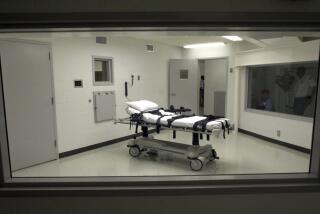High Court Sets Crucial Death Penalty Decisions
WASHINGTON — The Supreme Court has halted two executions this week and is preparing to issue four significant rulings on capital punishment by summer.
One case asks the justices to ban the electric chair. Two focus on a federal law aimed at speeding up executions. The fourth asks whether a person can be sentenced to die by a jury admittedly confused about a judge’s instructions.
The execution of a Virginia inmate who was to have died by lethal injection Thursday night was ordered postponed, an hour before it was scheduled to take place. The justices said they will fully review his case. At issue is federal court access for state prisoners.
Two nights earlier, they had halted a Florida electrocution and agreed to use that death row inmate’s case to decide whether death in the electric chair amounts to unconstitutionally cruel and unusual punishment.
Death row inmates in Arizona and Texas failed to win last-minute Supreme Court help this week. Those two executions raised the year’s total to 83, the most since 1954.
The justices are using a Virginia death row inmate’s case to clarify an expansive 1996 federal law, the Anti-Terrorism and Effective Death Penalty Act, which sharply limited federal court access for all defendants convicted in state courts.
At issue is how much discretion Congress wanted federal judges to have in reconsidering state courts’ findings.
In addition, the justices could agree as early as Monday to take up a pair of appeals from Nebraska and Florida that contend that keeping a convicted killer on death row for a long time--decades after conviction--amounts to unconstitutional cruel and unusual punishment.
More to Read
Get the L.A. Times Politics newsletter
Deeply reported insights into legislation, politics and policy from Sacramento, Washington and beyond. In your inbox three times per week.
You may occasionally receive promotional content from the Los Angeles Times.










